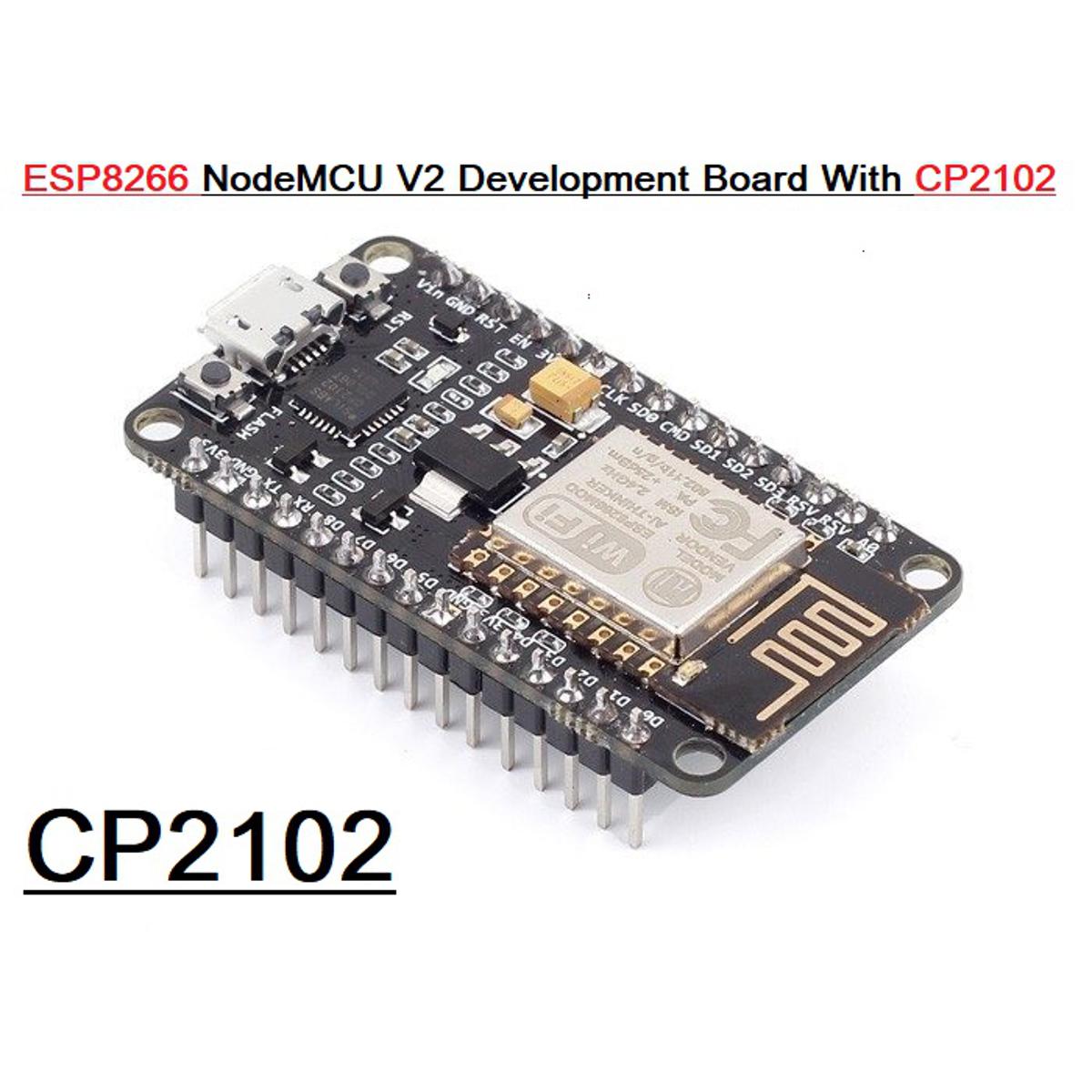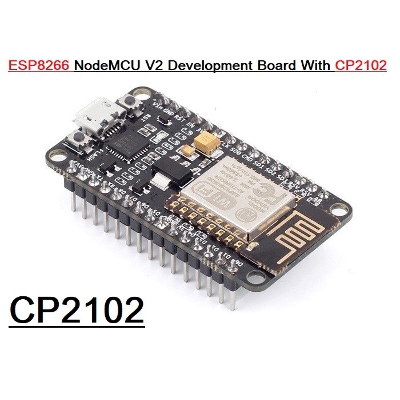Description: ESP8266 NodeMCU V2 Development Board with CP2102
ESP12E DevKit is based on the development of ESP8266 which is an ultra-low-power UART-WiFi module. It’s designed for mobile devices and networking applications, usually it can be applied to the Internet, LAN communications, smart home fields, industrial control, and other handheld devices. ESP12E DevKit selects the on-board PCB antenna package with 2.54 in-line package, so that it can debug equipment or direct product applications conveniently. ESP12E DevKit encapsulates ESP8266 hardware operation API by Lua language, which could enhance the ability of developers to quickly design products.
Arduino-like hardware IOAdvanced API for hardware IO, which can dramatically reduce the redundant work for configuring and manipulating hardware.Code like arduino, but interactively in Lua script.
Nodejs style network APIEvent-driven API for network applicaitons, which faciliates developers writing code running on a 5mm*5mm sized MCU in Nodejs style.Greatly speed up your IOT application developing process.
Lowest cost WI-FIOn-board ESP8266, a low-cost WiFi-MCU Module integrated and easy to prototyping development board. The best platform for IOT application development at the lowest cost.The Development board based on ESP8266, integrates GPIO, PWM, IIC, 1-Wire and ADC all in one board. Power your development in the fastest way combining with NodeMCU Firmware!
Features:
- Wireless 802.11 b / g / n standards;
- Support STA / AP / STA + AP three operating modes;
- Built-in TCP / IP protocol stack to support multiple TCP Client connection (5 MAX);
- D0 ~ D8, SD1 ~ SD3: used as GPIO, PWM, IIC, etc. Port Drive 15mA;
- AD0: 1 channel ADC;
- Power input: 4.5V ~ 9V (10VMAX), USB-powered, providing USB debugging interface;
- Current job: keep sending: ≈70mA (200mA MAX), Standby: <200uA;
- Transfer rate: 110-460800bps;
- Support UART / GPIO data communication interface;
- Remote firmware upgrade (OTA);
- Smart Link supports intelligent networking capabilities;
- Operating temperature: -40 ℃ ~ + 125 ℃;
- Drive Type: Dual high-power H-bridge driver
- Module Weight: about 7g
Specifications:
- Input Voltage: 7 – 12V
- Operating Voltage: 3.3V
- CPU: 32-bit RISC Tensilica Xtensa LX106 running at 80 MHz
- 64 KB of instruction RAM, 96 KB of data RAM (80x Arduino UNO!)
- 512 KB of EEPROM (512x Arduino UNO!)
- External QSPI flash – 512 KB to 4 MB* (up to 16 MB is supported)
- IEEE 802.11 b/g/n Wi-Fi
- Integrated TR switch, balun, LNA, power amplifier and matching network
- WEP or WPA/WPA2 authentication, or open networks
- Digital I/O Pins (DIO): 16
- Analog Input Pins (ADC): 1
- UARTs: 1 on dedicated pins, plus a transmit-only UART can be enabled on GPIO2
- SPIs: 1
- I2Cs: 1
- Flash Memory: 4 MB
- SRAM: 64 KB
- Clock Speed: 80 Mhz
- 80 Mhz clock (5x arduino UNO or mega!)
- Current: 215mA
- Dimensions: 49 x 24.5 x 13mm
Documentation:
You can find the firmware source code and documentation on Github, as well as nodemcu-flasher, a Windows only tools to flash the firmware to a module. There’s also a separate tool called esptool that will let you flash nodemcu from Linux. In case you find the documentation is all over the place, you might want to checkout NodeMCU video tutorial below.
Wiki & External links:
- CP210x USB to UART Bridge VCP Drivers
- Nodemcu.com is the official website for the project, but you’ll find more information on Github. You can also get answers to your questions on their BBS or ESP8622 community forums.
Package Include:
- 1 x NodeMCU V2 ESP8266 Development Board
- Wireless 802.11 b / g / n standards;
- Support STA / AP / STA + AP three operating modes;
- Built-in TCP / IP protocol stack to support multiple TCP Client connection (5 MAX);
- D0 ~ D8, SD1 ~ SD3: used as GPIO, PWM, IIC, etc. Port Drive 15mA;
- AD0: 1 channel ADC;
- Power input: 4.5V ~ 9V (10VMAX), USB-powered, providing USB debugging interface;
- Current job: keep sending: ≈70mA (200mA MAX), Standby: <200uA;
- Transfer rate: 110-460800bps;
- Support UART / GPIO data communication interface;
- Remote firmware upgrade (OTA);
- Smart Link supports intelligent networking capabilities;
- Drive Type: Dual high-power H-bridge driver
- Module Weight: about 7g
Login to ask a question
 Global Finds
Global Finds  Quick Commerce
Quick Commerce  Grocery
Grocery  Electronics & Appliances
Electronics & Appliances  Mother, Baby & Toys
Mother, Baby & Toys _20.png) Beauty
Beauty  Sports
Sports  Automotive
Automotive  Stationery, Books & Music
Stationery, Books & Music _20.png) Fashion Luxe
Fashion Luxe  Daily Bazar
Daily Bazar _20.jpeg) Home
Home  Garden & Pet Care
Garden & Pet Care  Special Weekly Offer
Special Weekly Offer  Global Finds
Global Finds  Quick Commerce
Quick Commerce  Grocery
Grocery  Electronics & Appliances
Electronics & Appliances  Mother, Baby & Toys
Mother, Baby & Toys _20.png) Beauty
Beauty  Sports
Sports  Automotive
Automotive  Stationery, Books & Music
Stationery, Books & Music _20.png) Fashion Luxe
Fashion Luxe  Daily Bazar
Daily Bazar _20.jpeg) Home
Home  Garden & Pet Care
Garden & Pet Care  Special Weekly Offer
Special Weekly Offer 


